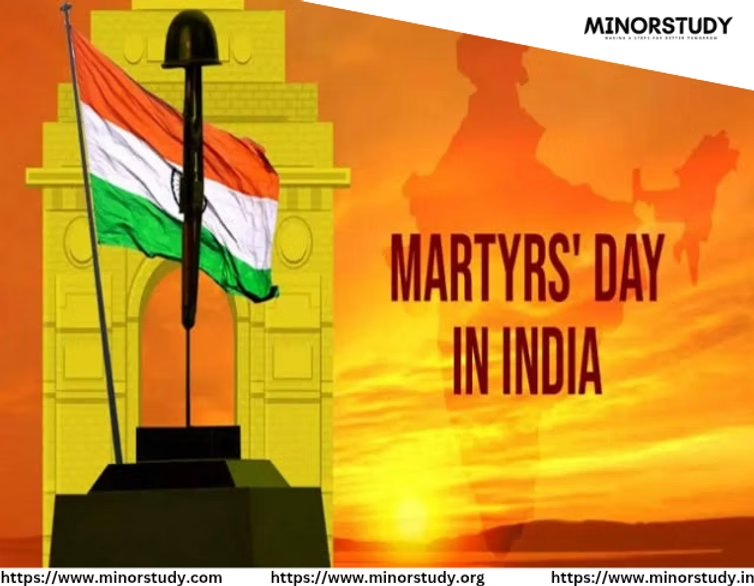🕯️ All About Martyrs Day – A Nation’s Tribute to Its Heroes
Martyrs Day: Every nation stands on the shoulders of those who gave everything—even their lives—for its freedom, dignity, and future. Martyrs Day, or Shaheed Diwas in India, is not just a date on the calendar. It is a soul-stirring reminder of selflessness, sacrifice, and the human cost of liberty. It’s the day we pause, reflect, mourn, and—above all—feel gratitude.
- 🕯️ All About Martyrs Day – A Nation’s Tribute to Its Heroes
- 📜 History of Martyrs Day: Remembering the Cost of Freedom
- 📊 10 Important Facts About Martyrs Day in India
- 🗓️ Timeline of Key Events
- 🎯 Significance of Martyrs Day in Our Life
- 💬 Popular FAQs about Martyrs Day
- 🌺 Wishing on Martyrs Day: Words of Tribute
- 📌 Important Points to Remember
- 💡 Daily Life Impacts and Modern Relevance
- 🏁 Conclusion: Why Martyrs’ Day Still Matters
India, with its rich and turbulent struggle for independence, observes Martyrs’ Day on multiple dates, each commemorating different fallen heroes who shaped the destiny of the country with their blood.
📜 History of Martyrs Day: Remembering the Cost of Freedom
The primary Martyrs Day in India is observed on 30th January, the day Mahatma Gandhi, the Father of the Nation, was assassinated in 1948 by Nathuram Godse in New Delhi. This tragic moment shook the country and marked a turning point in independent India’s early history.
But India doesn’t remember just one martyr or one date. There are other significant Martyrs’ Days observed on:
23rd March – In honor of Bhagat Singh, Sukhdev Thapar, and Shivaram Rajguru, who were hanged by British colonizers in 1931 for their revolutionary acts against imperialism.
17th November – In memory of Lala Lajpat Rai, who died in 1928 due to police brutality during a peaceful protest against the Simon Commission.
19th May (Bhasha Shahid Divas in Assam) – Honors the language martyrs who died advocating for the inclusion of Bengali as an official language.
These days are marked with solemnity, pride, and emotional remembrance, varying from region to region.
📊 10 Important Facts About Martyrs Day in India
Gandhi’s Death Anniversary (30th Jan) is nationally recognized and observed with two minutes of silence at 11:00 AM.
The President, Prime Minister, and other dignitaries gather at Raj Ghat to pay floral tributes.
All-India Radio and Doordarshan air special programs in honor of martyrs.
Students participate in essay competitions, marches, and plays about freedom fighters.
Armed forces across the country observe it with salutes and ceremonial gatherings.
Martyrs’ Day is not a public holiday but is solemnly observed in all government offices.
Shaheed Diwas (23rd March) is especially significant in Punjab and North India due to Bhagat Singh’s legacy.
In Maharashtra, Lala Lajpat Rai’s sacrifice is honored annually by various nationalist organizations.
State-specific days are also observed, like 21 October (Police Martyrs Day).
The term “Shaheed” is derived from Arabic, meaning “witness,” often used in the spiritual and patriotic context.
🗓️ Timeline of Key Events
| Year | Event |
|---|---|
| 1857 | The first major martyrdoms during the Revolt of 1857—India’s first war of independence. |
| 1907 | Kartar Singh Sarabha becomes one of the youngest revolutionaries to be executed. |
| 1919 | Jallianwala Bagh massacre, where hundreds of unarmed civilians were killed, leading to widespread martyrdoms. |
| 1928 | Lala Lajpat Rai dies due to police lathi-charge during Simon Commission protest. |
| 1931 | Bhagat Singh, Rajguru, Sukhdev hanged in Lahore Jail. |
| 1948 | Mahatma Gandhi assassinated, marking 30th January as Martyrs’ Day. |
| 1950 | The Government of India officially recognizes 30th January as national Martyrs’ Day. |
| 2000s | State-specific Martyrs’ Days begin to gain attention, such as Assam’s Language Martyrs and Police Commemoration Day. |
🎯 Significance of Martyrs Day in Our Life
Martyrs’ Day is not merely ceremonial. It serves as a moral compass for generations. Here’s why:
Gratitude: It reminds us of the price paid for the freedom we often take for granted.
Unity: Brings people of all castes, religions, and ideologies together in patriotic remembrance.
Reflection: A moment to reflect on whether we are upholding the values the martyrs died for—democracy, justice, and harmony.
Inspiration: Motivates youth to take interest in national service, social justice, and community well-being.
Healing: For families of martyrs and veterans, it serves as a national acknowledgment of their sacrifices.
💬 Popular FAQs about Martyrs Day
Q1: Why is Martyrs’ Day celebrated in India on 30th January?
A: Because it is the date Mahatma Gandhi was assassinated in 1948.
Q2: Are there other Martyrs’ Days in India?
A: Yes. 23rd March (Bhagat Singh and companions), 17th November (Lala Lajpat Rai), 19th May (Assam Language Martyrs), and others.
Q3: Is Martyrs’ Day a national holiday?
A: No, it is not a public holiday, but is observed officially with respect.
Q4: How is Martyrs’ Day observed in schools?
A: With speeches, essay competitions, patriotic songs, plays, and moments of silence.
Q5: What does “Shaheed” mean?
A: Derived from Arabic, it means “witness” and is used in the sense of someone who sacrifices their life for a higher cause.
🌺 Wishing on Martyrs Day: Words of Tribute
Though it is not a celebratory event, you can still share words of respect and remembrance on this day:
🕊️ “On this Martyrs’ Day, let’s bow our heads to the brave hearts who gave their all so we could live in freedom.”
🌸 “Salute to the real heroes who sacrificed their today for our tomorrow.”
🪔 “May the memories of our martyrs ignite the spirit of service and unity in every Indian heart.”
🇮🇳 “True patriots never die, they live in the hearts of generations. Jai Hind!”
📌 Important Points to Remember
Martyrs’ Day is not just about Gandhi—it’s a tribute to all Indian freedom fighters and defense personnel.
Observing silence at 11 AM on 30th January is a nationwide protocol.
Schools, colleges, and government bodies organize special events for awareness.
It’s an emotionally significant day, reminding us of the human cost of our constitution and democracy.
The real tribute lies not in flowers or slogans but in our actions—living the values our martyrs died for.
💡 Daily Life Impacts and Modern Relevance
In today’s fast-paced, digitally distracted life, Martyrs Day anchors us back to our roots. It reminds us to pause, think, and be grateful. Here’s how it impacts daily life:
It urges youth to read history and understand what freedom truly means.
It encourages the public to participate in civic responsibilities—voting, activism, community service.
It offers a moment of reflection in corporate and educational institutions to value ethics and duty.
For veterans and soldiers’ families, it offers recognition and emotional solidarity.
🏁 Conclusion: Why Martyrs’ Day Still Matters
Martyrs Day is not just a historical observance—it’s a living, breathing lesson in courage, conscience, and character. In a world that increasingly runs after power and wealth, this day reminds us that true greatness lies in sacrifice, not success.
In every silent moment of homage, every patriotic tear, every school child reciting Gandhi’s words or Bhagat Singh’s bravery—we keep the flame of their sacrifice alive.
So this Martyrs’ Day, don’t just remember—reconnect. Don’t just mourn—motivate. And above all, don’t forget—live their values.








